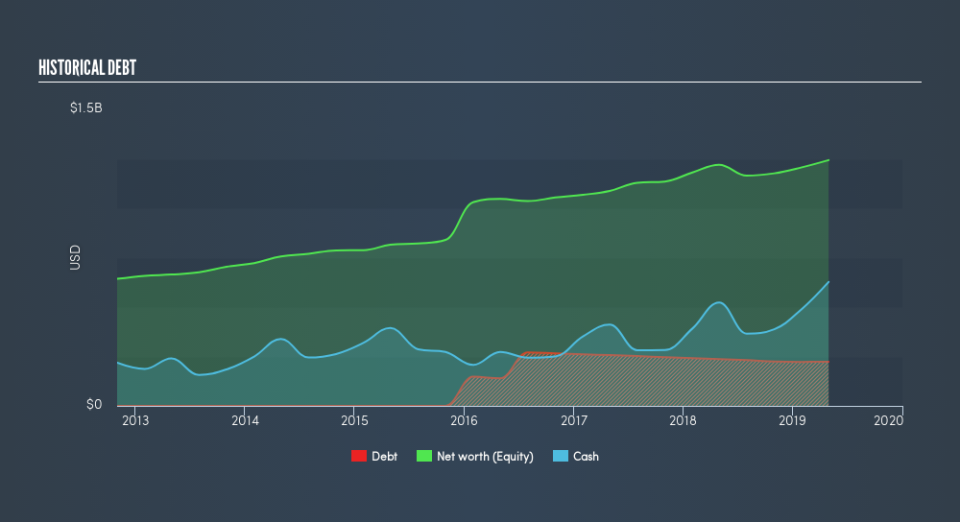Korn Ferry (NYSE:KFY) Seems To Use Debt Rather Sparingly

Warren Buffett famously said, 'Volatility is far from synonymous with risk.' So it might be obvious that you need to consider debt, when you think about how risky any given stock is, because too much debt can sink a company. As with many other companies Korn Ferry (NYSE:KFY) makes use of debt. But is this debt a concern to shareholders?
When Is Debt A Problem?
Generally speaking, debt only becomes a real problem when a company can't easily pay it off, either by raising capital or with its own cash flow. Part and parcel of capitalism is the process of 'creative destruction' where failed businesses are mercilessly liquidated by their bankers. However, a more common (but still painful) scenario is that it has to raise new equity capital at a low price, thus permanently diluting shareholders. By replacing dilution, though, debt can be an extremely good tool for businesses that need capital to invest in growth at high rates of return. When we examine debt levels, we first consider both cash and debt levels, together.
See our latest analysis for Korn Ferry
What Is Korn Ferry's Debt?
The image below, which you can click on for greater detail, shows that Korn Ferry had debt of US$222.9m at the end of April 2019, a reduction from US$236.2m over a year. But on the other hand it also has US$627.0m in cash, leading to a US$404.1m net cash position.
How Healthy Is Korn Ferry's Balance Sheet?
We can see from the most recent balance sheet that Korn Ferry had liabilities of US$551.0m falling due within a year, and liabilities of US$540.5m due beyond that. On the other hand, it had cash of US$627.0m and US$430.9m worth of receivables due within a year. So its liabilities outweigh the sum of its cash and (near-term) receivables by US$33.6m.
Having regard to Korn Ferry's size, it seems that its liquid assets are well balanced with its total liabilities. So it's very unlikely that the US$2.18b company is short on cash, but still worth keeping an eye on the balance sheet. While it does have liabilities worth noting, Korn Ferry also has more cash than debt, so we're pretty confident it can manage its debt safely.
Also good is that Korn Ferry grew its EBIT at 19% over the last year, further increasing its ability to manage debt. There's no doubt that we learn most about debt from the balance sheet. But it is future earnings, more than anything, that will determine Korn Ferry's ability to maintain a healthy balance sheet going forward. So if you're focused on the future you can check out this free report showing analyst profit forecasts.
Finally, a company can only pay off debt with cold hard cash, not accounting profits. Korn Ferry may have net cash on the balance sheet, but it is still interesting to look at how well the business converts its earnings before interest and tax (EBIT) to free cash flow, because that will influence both its need for, and its capacity to manage debt. Over the most recent three years, Korn Ferry recorded free cash flow worth 75% of its EBIT, which is around normal, given free cash flow excludes interest and tax. This free cash flow puts the company in a good position to pay down debt, when appropriate.
Summing up
While it is always sensible to look at a company's total liabilities, it is very reassuring that Korn Ferry has US$404m in net cash. The cherry on top was that in converted 75% of that EBIT to free cash flow, bringing in US$212m. So we don't think Korn Ferry's use of debt is risky. Over time, share prices tend to follow earnings per share, so if you're interested in Korn Ferry, you may well want to click here to check an interactive graph of its earnings per share history.
When all is said and done, sometimes its easier to focus on companies that don't even need debt. Readers can access a list of growth stocks with zero net debt 100% free, right now.
We aim to bring you long-term focused research analysis driven by fundamental data. Note that our analysis may not factor in the latest price-sensitive company announcements or qualitative material.
If you spot an error that warrants correction, please contact the editor at editorial-team@simplywallst.com. This article by Simply Wall St is general in nature. It does not constitute a recommendation to buy or sell any stock, and does not take account of your objectives, or your financial situation. Simply Wall St has no position in the stocks mentioned. Thank you for reading.

 Yahoo Finance
Yahoo Finance 
